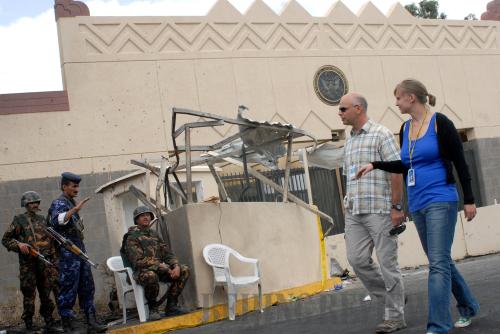|
 |
|
GUARDED: Yemeni soldiers guard the U.S. Embassy in Sana'a on September 18, 2008. The embassy was temporarily closed following Umar Farouk Abdulmutallab's failed attempt to bomb a U.S. passenger plane on Christmas Day 2009 (XINHUA/AFP) |
Even under the best of circumstances, disinformation operations can be difficult to detect and, in the context of the now geographically dispersed, highly decentralized terrorist groups, it may be close to impossible to see at this time.
To make matters worse, U.S. citizens continue to believe attacks on the United States will derive from individuals and groups operating outside the country (rather than from sleeper cells comprised largely of American citizens) and that the critical targets—generally speaking, those that can result in deaths—are domestic. Again, we fail to comprehend what the terrorist threat amounts to—the failure of our information sources to provide insights on motivations, goals and, perhaps most importantly, the strategies employed. It is the failure to recognize that actions outside the United States—such as a blockade of the straits of Hormuz or Malacca—would be far more destructive and disruptive to the United States and the global economy as a whole than any modest action aimed at a single passenger aircraft.
Even the information we now possess about Al Qaeda's actions and planning over the past decade indicates that relatively modest attacks carried out by the likes of Abdulmutallab are hardly consistent with their long-term objectives or operational methods.
Hard information on terrorism has been difficult for the United States to secure, and the possibility that what is observed is disinformation makes it all the more so. With the recent ground swell over Abdulmutallab's failed bombing attempt and the rush to find ways to plug the perceived security gaps, there is even a greater risk that the continuing focus on commercial airplanes will only further distort our understanding of terrorism and misdirect our focus on appropriate security measures.
Take-aways
We must understand that Islamist terrorists' motivations and goals are directed less at revenge than at a reckoning. For them, the future of Islam is at stake and even though eye-for-an-eye repayments are often desired, far more important are the opportunities for attacks that could result in a clear decline in the West's ability to continue to influence Islam. Thus, while the Abdulmutallab affair has occupied our imaginations since Christmas Day, we have yet to understand the meaning of his actions. While the destruction of a passenger airliner would capture headlines, simple death and destruction is probably a minor concern to the Islamist leadership.
Groups such as Al Qaeda have shown remarkable survival ability—even in view of the massive counterterrorist operations over the past eight or so years. Part of this success is due to their ability to maintain a clear internal focus while, at the same time, relying on the West to distort much of the information that would be required for an effective and efficient counterforce. In effect, we have been fighting a serious, committed enemy based on a distorted picture of the threat. Al Qaeda and others have recognized this weakness and have capitalized on this distortion by simply continuing to arrange for signals that support our ongoing failures of imagination: to wit, the Abdulmutallab affair.
Had Abdulmutallab been successful, there is little doubt that the United States would have reacted with major firepower directed at one or more of the Middle Eastern Jihadist training facilities. But as in the past, such retributive acts would probably only have played into the Islamist script, which calls for distorted information and an ever-narrowing field of imagination. But, even in failure, the Abdulmutallab affair will likely turn into a modest success for the jihadists since there will undoubtedly be both a sizable witch-hunt directed at determining who left the doors ajar and the dedication of whatever security expertise the United States can muster to plug security holes that are of little real consequence.
Perhaps Umar Farouk Abdulmutallab was an unwitting agent for clever Islamist strategists. Or he may have known in part the role he was to play in the disinformation package being served to the West. Either way, his failure will embolden Islamist leaders and strategists. It is yet another example of how easily the West can be stymied by fixating on what we think the enemy should be doing—as if he were us—rather than concentrating on the enemy's real objectives.
(Viewpoints in this article do not necessarily represent those of Beijing Review)
Stephen Gale is a professor of political science at the University of Pennsylvania and chair of the Center on Terrorism and Counterterrorism at the Philadelphia-based Foreign Policy Research Institute. Gregory Montanaro is executive director of the Center
| 